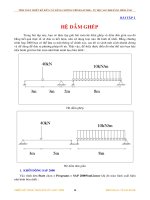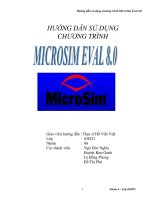Tài liệu hướng dẫn sử dụng biến tần danfoss 2
Bạn đang xem bản rút gọn của tài liệu. Xem và tải ngay bản đầy đủ của tài liệu tại đây (2.88 MB, 7 trang )
VLT
®
2800 Series
■ Grounding of screened/armored control cables
In general, control cables must be screened/armored,
and the screen must be connected to the unit’s
grounding plate with a cable clamp at each end. The
drawing shows the correct way to perform grounding.
1. Correct grounding
Control cables and cables for serial
communication must be attached with cable
clamps at both ends to ensure maximum
possible electrical contact.
2. Incorrect grounding
Do not use screen ends that are twisted
together (pigtails), as these increase screen
impedance at higher frequencies.
3. Equalizing the ground potential between
a PLC and the adjustable frequency drive
If there is a different ground potential between
the drive and the PLC, electrical noise can be
generated which could interfere with the whole
system. This problem can be solved by attaching
a compensation cable, which is placed beside the
control cable. Minimum cable diameter: 6 AWG.
4. In the event of a 50/60 Hz ground loop
If very long control cables are used, 50/60 Hz
ground loops can arise which can interfere with
the whole system. This problem is resolved by
attaching one end of the screen to ground via a
100 µF condenser (short pin length).
MG.28.A7.22 - VLT is a registered Danfoss trademark
10
VLT
®
2800 Series
Installation
■ Diagram
* Integrated 1A RFI filter and brake is an option.
** VLT 2803-2815 200-240 V is not supplied
with intermediate circuit coils.
MG.28.A7.22 - VLT is a registered Danfoss trademark
11
VLT
®
2800 Series
■ Electrical installation
VLT 2803-2815 200-240 V, 2805-2815 380-480 V
VLT 2822 200-240 V, 2822-2840 380-480 V
MG.28.A7.22 - VLT is a registered Danfoss trademark
12
VLT
®
2800 Series
Installation
VLT 2840 200-240 V, 2855-2875 380-480 V
VLT 2880-2882 380-480V
Please note, that the units will be supplied
with two bottom plates; one for metric glands
and one for conduits.
MG.28.A7.22 - VLT is a registered Danfoss trademark
13
VLT
®
2800 Series
■ Safety clamp
To maintain the galvanic isolation (PELV) between
the control terminals and high-voltage terminals, the
accompanying safety clamp must be attached to
VLT 2803-2815, 200-240 V, and VLT 2805-2815,
380-480 V. Attach the safety clamp to the strain
relief plate with the two screws provided.
■ Input fuses
For all unit types, external fuses must be fitted in the
AC line supply to the drive. For UL/cUL applications
with an AC voltage of 200-240 Volts, use fuses type
Bussmann KTN-R (200-240 Volts) or Ferraz Shawmut
type ATMR (max. 30A). For UL/ cUL applications
with an AC voltage of 380-480 Volts, use fuses type
Bussmann KTS-R (380-480 Volts). See Technical data
in this manual for correct dimensioning of fuses.
It is the responsibility of the installer or
user to insure proper external AC power
input fusing to the drive.
■ AC line connection
All drives that are equipped with an RFI
filter cannot be connected to a grounded
DELTA or IT mains/AC line system.
NOTE
Check that the AC voltage matches the voltage
rating of the drive. The drive rating is on the
drive nameplate. See Technical data in this
manual for correct dimensioning of cable cross-section.
For single phase 220-240 Volts input, attach the
neutral wire to terminal N
(L2)
and connect the
phase wire to terminal L1
(L1)
.
No. N
(L2)
L1
(L1) (L3)
AC line voltage 1 x 220-240 V
NL1
No. 95 Ground connection
No. N
(L2)
L1
(L1) (L3)
AC line voltage 3 x 220-240 V
L2 L1 L3
No. 95 Ground connection
No. 91 92 93 AC line voltage 3 x 380-480 V
L1 L2 L3
No. 95 Ground connection
380-460 Volt units with RFI-filters may not
be connected to AC line supplies in which
the voltage between phase and ground is
more than 300 Volts. Please note that for the AC line
for IT and the delta ground the AC line voltage can
exceed 300 Volts between phase and ground. Units
with type code R5 can be connected to mains supplies
with up to 400 V between phase and ground.
See Technical data for correct dimensioning
of cable cross-section.
■ Motor connection
NOTE
It is recommended that an LC filter be
connected to the output of the drive for motors
without phase insulation paper.
See Technical data in this manual for correct
dimensioning for cable cross-section. All types
of three-phase asynchronous standard motors
can be connected to a drive.
Connect the motor to terminals 96, 97, 98.
Connect ground to terminal 99.
N0. 96 97 98 Motor voltage 0-100%
UVW of AC line voltage.
N0. 99 Ground connection
See Technical data for correct dimensioning
of cable cross-section.
Ensure that the motor is wired for the line voltage
before connecting to the drive.
■ Direction of motor rotation
To change the direction of motor rotation, switch any
two phases at the drive output or at motor terminals.
■ Motor thermal protection
The electronic thermal relay in the adjustable frequency
drive has received the UL-approval for single motor
protection, when the following parameters have been
set. Enter the rated motor current from the motor
nameplate in parameter 105, Motor current. Set
MG.28.A7.22 - VLT is a registered Danfoss trademark
14
VLT
®
2800 Series
Installation
parameter 128, Motor thermal protection, for ETR Trip.
See Programming the adjustable frequency drive in this
manual for instructions on programming parameters.
■ Parallel connection of motors
Theadjustablefrequencydriveisabletocontrol
several motors connected in parallel. The combined
total current consumption of the motors is not to
exceed the maximum rated output current (I
INV
)for
the adjustable frequency drive. If the motors are to
have different rpm values, use motors with different
rated rpm values. Motor frequency is changed
simultaneously, which means that the ratio between
the rated rpm values is maintained.
Problems may arise at start-up and when operating
at low rpm if the motor sizes are widely different.
This is because the small motors’ relatively high
resistance in the stator calls for a higher voltage
at the start-up and at low rpm.
In systems with motors connected in
parallel, the electronic thermal relay (ETR)
of the adjustable frequency drive cannot
be used as motor protection for the individual motor.
Protection must be provided individually for each motor.
■ Motor cables
See Technical data in this manual for correct
dimensioning of motor cable cross-section and
length. Always comply with national and local
regulations on cable cross-section.
NOTE
Using unshielded/unarmored cable may not
comply with some RFI requirements
Keep the motor cable as short as possible to reduce
the noise level and to keep leakage currents to a
minimum. Connect the motor cable shield to the
ground connection of both the unit and the motor.
Use cable clamps rather than twisted shield ends
(pigtails), for installation to provide shielding at high
frequencies. If it is necessary to break the shield to
install a motor isolator or motor relay, the shield must
be continued at the lowest possible HF impedance.
■ Brake connection
NOTE
Voltages up to 850 VDC occur on the terminals.
No. 81 82 Brake resistor
R- R+ terminals
Connect the brake resistor wiring to drive terminals 81
and 82. The connection cable to the brake resistor
must be shielded/armored. Connect the shield to
both the ground of the drive and the brake resistor by
means of cable clamps. Dimension the cross-section
of the brake cable to match the brake torque.
■ Ground connection
Since the leakage currents to ground may be higher
than 3.5 mA, the adjustable frequency drive must
always be connected to ground in accordance with
applicable national and local regulations. To ensure
that the ground cable has good mechanical connection
to terminal 95, the cable cross section must be a
minimum 7 AWG (10 mm
2
). To improve protection
even further, a Recidual Current Device (RCD) can be
fitted to ensure that the adjustable frequency drive
cuts out when the leakage currents get too high. Also
see RCD Application note MN.90.GX.02.
MG.28.A7.22 - VLT is a registered Danfoss trademark
15
VLT
®
2800 Series
■ Load sharing
Load sharing provides the facility to connect several
frequency converters’ DC intermediate circuits.
This requires that the installation is extended using
extra fuses and AC coils (see drawing below).
For load sharing parameter 400 Brake function
must be set to Load sharing [5].
Use 6.3 mm Faston Plugs for DC (Load Sharing).
Contact Danfoss or see instructions no. MI.50.NX.02
for further information.
No. 88 89 Loadsharing
-+
Note that voltage levels of up to 850 V DC
may occur between terminals 88 and 89.
■ Tightening Torque, Power Terminals
Power and earth terminals must be tightened
with the following torques:
VLT Terminals Torque [Nm]
Power mains brake 0.5–0.62803–
2875
Earth 2–3
Power mains brake 1.2–1.52880–
2882
Earth 2–3
■ Control of mechanical brake
In lifting/lowering applications, an electromagnetic
brake is used which is controlled by the adjustable
frequency drive. The brake is controlled using a
relay output or digital output (terminal 46). The
output must be kept open (voltage-free) for the
period of time during which the adjustable frequency
driveisnotableto’support’ the motor, as when
the load being too great. Select Mechanical brake
control in parameter 323 (relay) or 341(digital) for
applications with an electromagnetic brake.
When the output frequency exceeds the brake cut out
value, set in parameter 138, the brake is released if the
motor current exceeds the preset value in parameter
140. The brake is activated when the output frequency
is less than the brake in frequency. Set the cut in
frequency in parameter 139, Break cut in frequency.
If the adjustable frequency drive is placed at alarm
status or in an overvoltage situation the mechanical
brake is cut in immediately. See Programming
the adjustable frequency drive in this manual for
instructions on progtamming parameters.
NOTE
This application is only for lifting/lowering
without counterbalance.
MG.28.A7.22 - VLT is a registered Danfoss trademark
16









